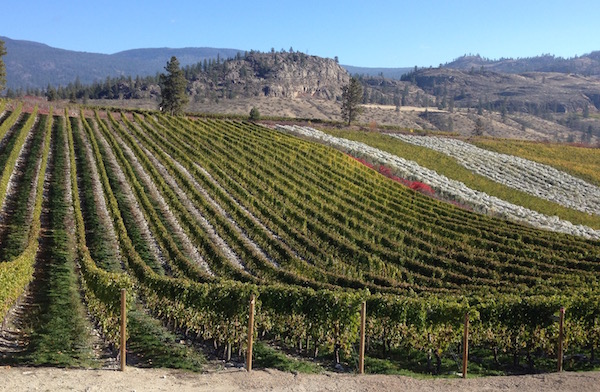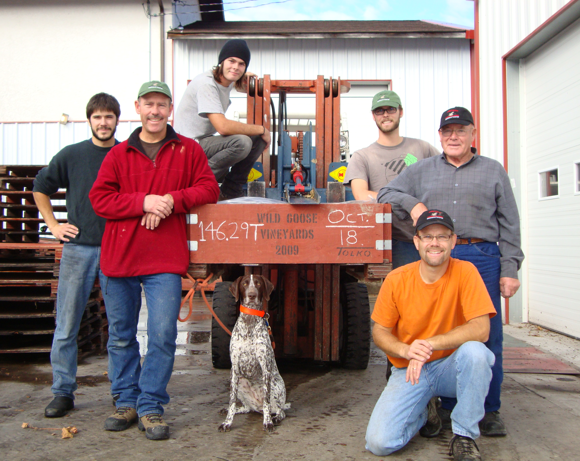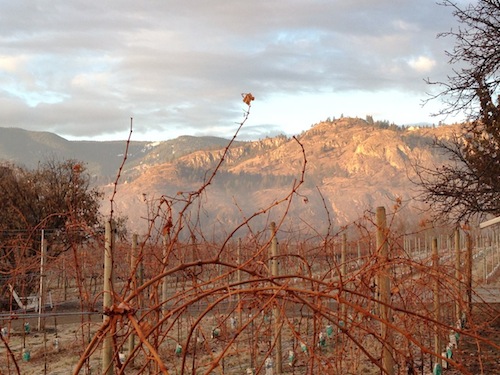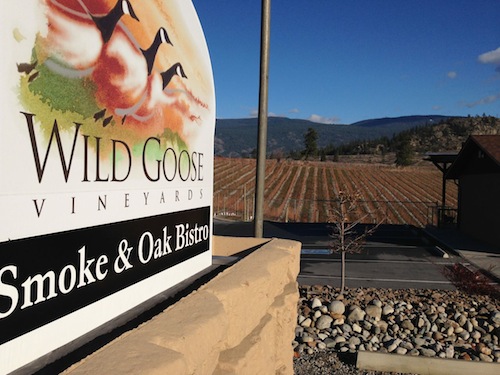
OKANAGAN FALLS, British Columbia — Adolf Friedrich Kruger, founder of acclaimed Wild Goose Vineyards and a key figure in the rise of the modern British Columbia wine industry, died Nov. 20 of cancer at the age of 85.
His family said Kruger, who went by the nickname “Fritz,” passed away peacefully at Moog and Friends Hospice House in nearby Penticton. His wife and winery co-founder, Susanna, died in 2014, also from cancer.
“Adolf always went out of his way to embrace the industry, and he and Susie did a great job of integrating their sons into the business,” Harry McWatters, founding chair of the BC Wine Institute, told Great Northwest Wine late Wednesday. “Now there’s a third generation involved, so those family traits just run in their blood.
“I’ve never met anyone who didn’t like any of the Krugers,” McWatters added. “It started with Adolf, and the apple hasn’t fallen far from the tree with his kids.”
A memorial service will be staged Dec. 3 at Linden Gardens in Kaleden, followed by an open house at the 15,000-case winery he and sons Hagen and Roland have developed into one of the best in the Pacific Northwest.
“No one is more blessed than me with having these two guys around,” Fritz told Great Northwest Wine during a 2015 interview. “My life has been absolute perfection in that respect. I don’t think I could have it any better.”
In 1990, Wild Goose became British Columbia’s 18th licensed winery. Kruger, a founding director of the BC Wine Institute, was inducted into the BC Wine Museum and received the Okanagan Wine Festivals Founders Award in 2006.
In 2009, Wine Press Northwest magazine in Washington state named Wild Goose Vineyards as its Pacific Northwest Winery of the Year.
McWatters said he viewed Kruger as a pioneer and respected ally during the modern-day rise of the British Columbia wine industry.
“Absolutely,” McWatters said. “Adolf wasn’t involved in the wine business before the creation of the BC Wine Institute, but instead of bucking the system, he embraced the system from day one and always strived to make higher quality wine. He got it.”
According to Canadian wine journalist John Schreiner, Wild Goose has received more Lt. Governor Awards for Excellence in Wine than any other in the province.
An early love for Riesling

Kruger grew up near Berlin before he and his brother, Horsti, fled to West Germany in 1949. Life in the Rhine Valley introduced him to Riesling, and Adolf forever was smitten with that noble white grape.
“Wine was cheaper than beer,” he said. “So consequently, we drank wine!”
Two years later, he made his way to Canada. It was in Winnipeg, Manitoba, where he met Susie, before they put down roots in 1964 in Vancouver where he pursued a career in electrical design and raised their two sons.
By 1982, he began to approach retirement and moved northeast to 70 Mile House, where the German spent what he would later describe as an “uncomfortably cold” winter. A trip the following spring to the Okanagan Valley to visit a longtime friend, vineyard owner Nick Broderson in Kaleden, inspired Kruger — by this time an amateur winemaker — and his family to enter the wine industry as growers.
They soon bought 10 acres in Okanagan Falls along Sun Valley Way, and in 1984 they established Stoney Vine Vineyard with Riesling and Gewürztraminer.
A leader in the farmgate movement

Kruger’s first grapes went to Mission Hill Family Estate in 1987, but at that point the BC wine industry was dominated winter-hardy hybrid grape varieties. The new European Union banned the use of those grapes in the production of quality table wine. And the Canada-U.S. Free Trade Agreement of 1987 was poised to open the doors to foreign wines and reduce tariffs. British Columbians would soon have access to more world-class wines and come to reject the locally produced jug wines. It would have the same effect as the California Wine Bill did in Washington state, starting in 1969.
As a result, federal and provincial governments sponsored a $28 million pullout of hybrid grape vines after the 1988 harvest.
“Right after the free trade agreement, there were only two options available,” McWatters said. “You could take the money from the government, pull out your vines and find a new career. Or, you could replant and contract with a winery to sell your fruit, but the wineries were hesitant to issue contracts because there were so many unknowns.”
The pullout of 2,300 acres of hybrids, according to Schreiner in his book The British Columbia Wine Companion, left the province with about 1,000 acres of vinifera. Riesling was the largest and most proven variety left standing — about 150 acres.
However, the government had made it essentially impossible for small growers to start their own wineries and sell directly to customers who visited their estate. Kruger saw the potential of the Okanagan Valley to produce world-class wines and sought to make wine from his Stoney Vine grapes.
“Before that, to be an estate winery you had to maintain at least 20 acres and make your wines with at least 50 percent of the grapes from your own land,” McWatters said. “I think Adolf had 10 acres to start with.”
So Kruger began to lobby the provincial government to get the laws changed. In the fall of 1989, they allowed for the creation of farmgate wineries. Hillside, Lang and Wild Goose were the first three such vineyard/winery operations.
The next year marked the creation of the BC Wine Institute and a quality-assurance program. The government permitted farmgate wineries on less than 10 acres, but they needed to source at least 75 percent of their wine grapes from their own land – and the wines had to go through a tasting panel in order to be sold at a provincial liquor store. It was the precursor to the Vintners Quality Alliance system that — while still controversial in a free-market society — remains in play today.
“Adolf is the one who really understood the rules and said it was a very livable situation,” McWatters said.
And there now are more than 10,500 acres of vineyard established throughout British Columbia.
Proud proponent of Gewürztraminer

One criteria for the VQA review panel was the wine had to exhibit that grape’s characteristics.
“That was one of the big challenges with the VQA in the early stages, being true to the varietal, and Adolf bought into that,” McWatters said. “These were basically grape growers and amateur winemakers — that was the feeling of the other winemakers. They encouraged and endorsed what was happening, but they wanted the consumer to know these (farmgate) wines were fault-free.”
Kruger’s early effort with Gewürztraminer didn’t quite match up with what some on the tasting panel viewed as true to the grape. However, Kruger took that with a positive attitude and saw it as an opportunity to raise the bar, so he continued his research and work with the Alsatian variety.
“That speaks volumes to his character,” McWatters said. “He wasn’t always in complete agreement with the panel, but he respected the system.”
Twenty years after the creation of the farmgate winery concept, Wine Press Northwest gave its top award to Wild Goose Vineyards and featured Kruger’s winery as the cover story. And the Gewürztraminer program, spearheaded by Adolf’s winemaking son Hagen, is arguably the best in the Pacific Northwest.
“Look at their wines now,” McWatters said. “They are not only great wines, but they are great wines at very, very attractive prices.”
Awards, diversification for Wild Goose

It’s always been a family affair at Wild Goose. Fritz made the early wines until handing those duties to Hagen in 1998. Roland long has served as the general manager. And while they work with several growers, they’ve acquired and proudly developed three sites together — the original Stoney Slope, Mystic River and their large planting near Secrest Road in Oliver. Mystic River Vineyard, another site in Oliver, blossomed after the Krugers replanted it to Gewürztraminer and Pinot Blanc.
“Hagen is the ultimate winemaker,” Fritz told Great Northwest Wine last year. “And Roland is the perfect businessman. Between the two of them, it’s been an absolute success.”
In the past decade, Wild Goose Vineyards has earned 19 Platinum medals in Wine Press Northwest magazine’s year-end best-of-the-best judging. And in 2014, the Wild Goose 2012 God’s Mountain Vineyard Riesling earned best of show at the Great Northwest Invitational Wine Competition, beating out 425 other wines from Washington, Oregon, British Columbia and Idaho.
Recently, Hagen’s sons have seen their responsibilities grow with Nikolas as a winemaker and Alexander a viticulturist.
In addition to being proud of his family, vineyards and winery, Adolf took special delight in the success of Wild Goose’s on-premise Smoke & Oak Bistro, which opened in 2014. Fritz described the barbecue-themed menu as “Southern food with a German soul.” It also afforded him more opportunities to greet visitors and catch up with friends in the wine industry. For decades next door, Fritz and Susie would often welcome folks into their home for delicious meals and fellowship.
“I’d see him upset or disappointed at times, but I never saw him down,” McWatters said. “He was always a positive thinking guy, and he was always just so happy to see you at his winery. He made sure people left Wild Goose with a really good experience. He’s going to be missed.”
In lieu of flowers, the family has established the Adolf Kruger Bursary Fund for the Winery Assistant’s Program at Okanagan College’s Penticton campus as a way to help students entering the BC wine industry.
“I am greatly honoured to have met so many kind, dedicated and passionate people in an industry that has worked so hard to establish itself as a viable, premium grape and wine producing industry,” Kruger told his family during his final days. “To see nearly 300 wineries licensed in BC today is something I could never have imagined when we opened back in 1990.”

Leave a Reply